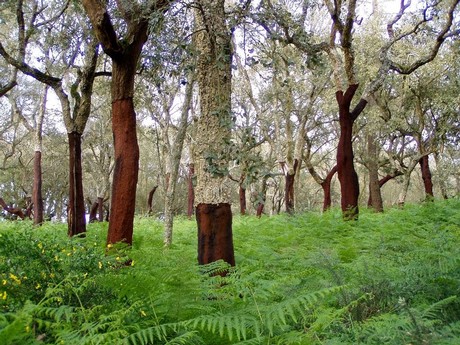Cork: A Story of Tradition and Sustainablity
At Beauregard Vineyards we take tradition and sustainability seriously. The Beauregard family’s roots in winemaking began in 1949, a little over 15 years after prohibition was lifted. Our winemaker’s great grandfather, Amos Beauregard, a retired Sheriff purchased our original estate vineyard in Bonny Doon, CA. The area had a long history of grape growing and wine production dating back to the 1800’s. Over the past 60 years the Beauregard family has expanded their estate vineyards and started the family label with a focus on tradition.
One way we hold onto tradition here at Beauregard Vineyards is our old world winemaking style and another is our continued use of natural corks. Cork comes from the bark of the cork oak, which has been considered a nobel tree for thousands of years.
Cork oak grows in Mediterranean regions, Portugal being one of the foremost producers and one of the first cork oak environmental protectors.

The noble cork oak tree can live on average 150 to 200 years. It takes 25 years for the cork oak truck to produce its cork bark and the first stripping or virgin cork cannot be used for wine corks.
Cork production does not involve the cutting down of any trees. The trees are gently stripped nude of their bark during the summer season.
To extract the cork two cuts are made to start, then a series of vertical openings are cut. Extractors must use strength and precision to cut the bark away without damaging the tree.
Nine years later these trees will be ready to be stripped again of their cork bark. Each cork oak will be stripped an average of 16 times over the course of its life.
“Approximately 6.6 million acres of Mediterranean cork forest extend across Portugal, Spain, Algeria, Morocco, Italy, Tunisia and France. These oak forests support one of the world's highest levels of forest biodiversity, second only to the Amazonian Rainforest.”
The cork is the most sustainable, ecological, recyclable and biodegradable material used for sealing a wine bottle. Screw caps are the most cost effective enclosure, however they are made from a non-renewable aluminum. Therefore not only is cork the traditional method for wine closures, it remains the most sustainable. With this in mind it will remain Beauregard Vineyards choice enclosure for our wine bottles. Celebrate this choice by popping the cork of a Beauregard wine today!
*Facts Courtsey of Cork Forest Conservation Alliance & real cork.org











